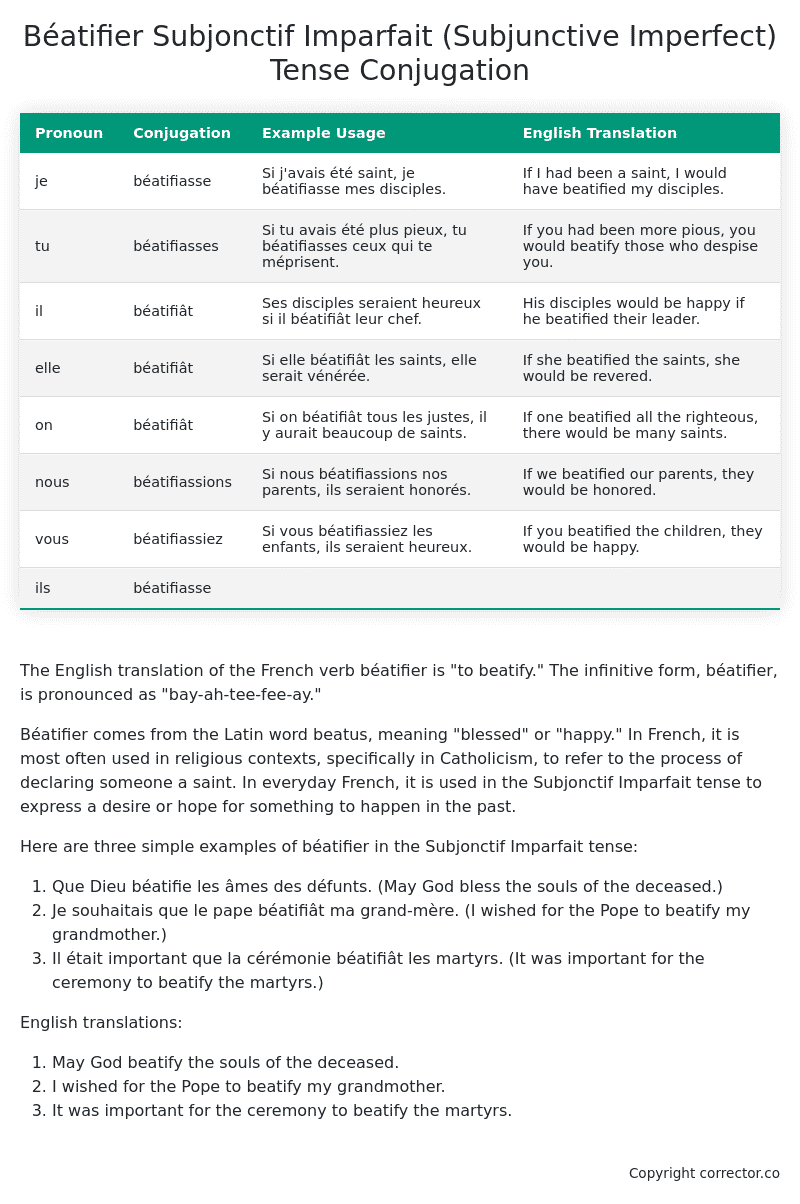Subjonctif Imparfait (Subjunctive Imperfect) Tense Conjugation of the French Verb béatifier
Introduction to the verb béatifier
The English translation of the French verb béatifier is “to beatify.” The infinitive form, béatifier, is pronounced as “bay-ah-tee-fee-ay.”
Béatifier comes from the Latin word beatus, meaning “blessed” or “happy.” In French, it is most often used in religious contexts, specifically in Catholicism, to refer to the process of declaring someone a saint. In everyday French, it is used in the Subjonctif Imparfait tense to express a desire or hope for something to happen in the past.
Here are three simple examples of béatifier in the Subjonctif Imparfait tense:
- Que Dieu béatifie les âmes des défunts. (May God bless the souls of the deceased.)
- Je souhaitais que le pape béatifiât ma grand-mère. (I wished for the Pope to beatify my grandmother.)
- Il était important que la cérémonie béatifiât les martyrs. (It was important for the ceremony to beatify the martyrs.)
English translations:
- May God beatify the souls of the deceased.
- I wished for the Pope to beatify my grandmother.
- It was important for the ceremony to beatify the martyrs.
Table of the Subjonctif Imparfait (Subjunctive Imperfect) Tense Conjugation of béatifier
| Pronoun | Conjugation | Example Usage | English Translation |
|---|---|---|---|
| je | béatifiasse | Si j’avais été saint, je béatifiasse mes disciples. | If I had been a saint, I would have beatified my disciples. |
| tu | béatifiasses | Si tu avais été plus pieux, tu béatifiasses ceux qui te méprisent. | If you had been more pious, you would beatify those who despise you. |
| il | béatifiât | Ses disciples seraient heureux si il béatifiât leur chef. | His disciples would be happy if he beatified their leader. |
| elle | béatifiât | Si elle béatifiât les saints, elle serait vénérée. | If she beatified the saints, she would be revered. |
| on | béatifiât | Si on béatifiât tous les justes, il y aurait beaucoup de saints. | If one beatified all the righteous, there would be many saints. |
| nous | béatifiassions | Si nous béatifiassions nos parents, ils seraient honorés. | If we beatified our parents, they would be honored. |
| vous | béatifiassiez | Si vous béatifiassiez les enfants, ils seraient heureux. | If you beatified the children, they would be happy. |
| ils | béatifiasse |
Other Conjugations for Béatifier.
Le Present (Present Tense) Conjugation of the French Verb béatifier
Imparfait (Imperfect) Tense Conjugation of the French Verb béatifier
Passé Simple (Simple Past) Tense Conjugation of the French Verb béatifier
Passé Composé (Present Perfect) Tense Conjugation of the French Verb béatifier
Futur Simple (Simple Future) Tense Conjugation of the French Verb béatifier
Futur Proche (Near Future) Tense Conjugation of the French Verb béatifier
Plus-que-parfait (Pluperfect) Tense Conjugation of the French Verb béatifier
Passé Antérieur (Past Anterior) Tense Conjugation of the French Verb béatifier
Futur Antérieur (Future Anterior) Tense Conjugation of the French Verb béatifier
Subjonctif Présent (Subjunctive Present) Tense Conjugation of the French Verb béatifier
Subjonctif Passé (Subjunctive Past) Tense Conjugation of the French Verb béatifier
Subjonctif Imparfait (Subjunctive Imperfect) Tense Conjugation of the French Verb béatifier (this article)
Subjonctif Plus-que-parfait (Subjunctive Pluperfect) Tense Conjugation of the French Verb béatifier
Conditionnel Présent (Conditional Present) Tense Conjugation of the French Verb béatifier
Conditionnel Passé (Conditional Past) Tense Conjugation of the French Verb béatifier
L’impératif Présent (Imperative Present) Tense Conjugation of the French Verb béatifier
L’infinitif Présent (Infinitive Present) Tense Conjugation of the French Verb béatifier
Struggling with French verbs or the language in general? Why not use our free French Grammar Checker – no registration required!
Get a FREE Download Study Sheet of this Conjugation 🔥
Simply right click the image below, click “save image” and get your free reference for the béatifier Subjonctif Imparfait tense conjugation!

Béatifier – About the French Subjonctif Imparfait (Subjunctive Imperfect) Tense
Formation
Common Everyday Usage Patterns
Interactions with Other Tenses
Subjonctif Présent
Indicatif Passé Composé
Conditional
Conditional Perfect
Summary
I hope you enjoyed this article on the verb béatifier. Still in a learning mood? Check out another TOTALLY random French verb conjugation!


